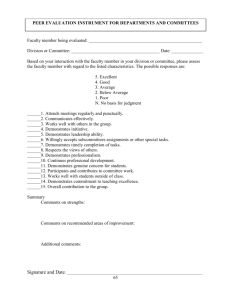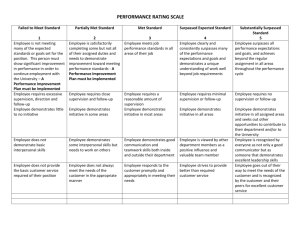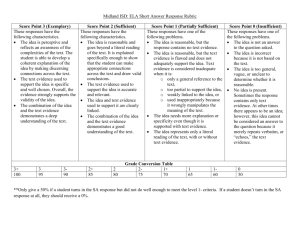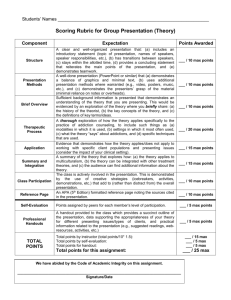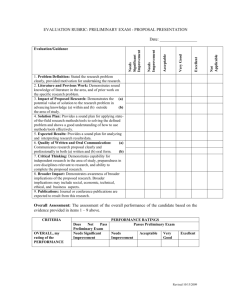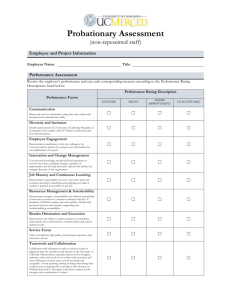Practicum Evaluations Assessment
advertisement
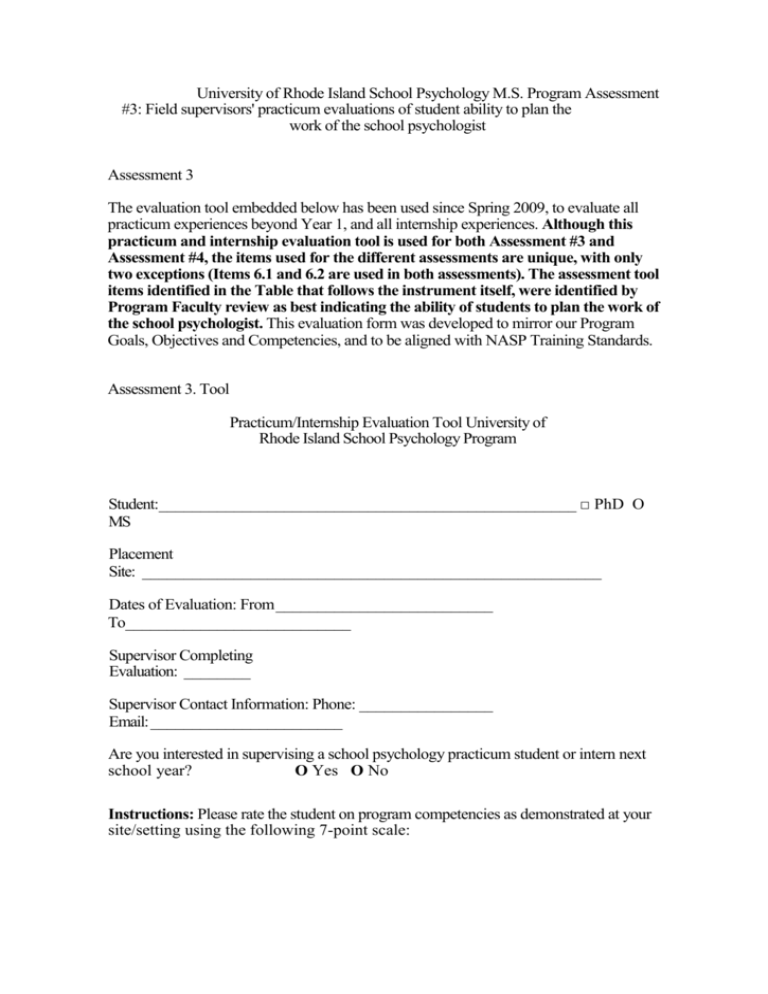
University of Rhode Island School Psychology M.S. Program Assessment #3: Field supervisors' practicum evaluations of student ability to plan the work of the school psychologist Assessment 3 The evaluation tool embedded below has been used since Spring 2009, to evaluate all practicum experiences beyond Year 1, and all internship experiences. Although this practicum and internship evaluation tool is used for both Assessment #3 and Assessment #4, the items used for the different assessments are unique, with only two exceptions (Items 6.1 and 6.2 are used in both assessments). The assessment tool items identified in the Table that follows the instrument itself, were identified by Program Faculty review as best indicating the ability of students to plan the work of the school psychologist. This evaluation form was developed to mirror our Program Goals, Objectives and Competencies, and to be aligned with NASP Training Standards. Assessment 3. Tool Practicum/Internship Evaluation Tool University of Rhode Island School Psychology Program Student:__________________________________________________ □ PhD O MS Placement Site: _______________________________________________________ Dates of Evaluation: From __________________________ To___________________________ Supervisor Completing Evaluation: ________ Supervisor Contact Information: Phone: ________________ Email: _______________________ Are you interested in supervising a school psychology practicum student or intern next school year? O Yes O No Instructions: Please rate the student on program competencies as demonstrated at your site/setting using the following 7-point scale: 1 2 Fails to demonstrate skill; needs to improve Demonstrates some skill; needs a great deal of supervision 3 4 Demonstrates Demonstrates competence, excellence, with with supervision supervision 5 Demonstrates excellence; as well as top 10% of those I have supervised 6 No Opportunity To Observe 7 No Opportunity For Student To Practice DOMAIN 1. Research Methods and Applications ___ 1.1. Student synthesizes psychological and educational theoretical and empirical knowledge bases, and uses findings in designing research and delivering schoolpsychology service. ___ 1.2. Student demonstrates knowledge and use of a range of research designs and methods (e.g., group, small-/?, single subject, evaluation, and qualitative research) employed in basic and applied psychological and educational research studies. ___ 1.3. Student designs and evaluates educational and psychological services/programs using appropriate professional research/evaluation tools. ___ 1.4. Student formulates accurate/valid interpretations of research findings and/or practice outcomes, based on design and analysis characteristics of the research, including considerations of internal- and external-validity issues. ___ 1.5. Student disseminates psychological and educational knowledge base and empirical findings to professional and community audiences. 1 2 Fails to demonstrate skill; needs to improve Demonstrates some skill; needs a great deal of supervision 3 4 Demonstrates Demonstrates competence, excellence, with with supervision supervision 5 Demonstrates excellence; as well as top 10% of those I have supervised 6 No Opportunity To Observe 7 No Opportunity For Student To Practice DOMAIN 2. Ethical, Legal, and Professional Standards and Guidelines ___ 2.1. Student conducts her/himself in accordance with the ethical, legal, and practice guidelines of the profession (e.g., APA, NASP). 2.2. Student engages in continuous professional learning, grounded in selfevaluation, by participating in education and training to improve professional practices. ___ 2.3. Student knows personal and professional limitations and seeks consultation. DOMAIN 3. Professional Disposition and Interpersonal Skills ___ 3.1. Student uses good communication skills (e.g., listens well; communicates clearly and effectively with different audiences; stays engaged, committed, and patient in challenging interactions; provides constructive criticism and feedback). ___ 3.2. Student shows respect and concern for the needs and views of others. ___ 3.3. Student demonstrates professional disposition (e.g., is dependable, takes initiative, is prompt, dresses appropriately for work, follows policies and procedures of setting, completes documentation/paperwork in a timely manner,). ___ 3.4. Student demonstrates strong collaboration skills (e.g., is prepared and responsible, shares information, seeks input from others, makes positive contributions to group efforts, actively engages in change efforts at multiple levels). ___ 3.5. Student demonstrates good problem-solving and negotiation skills (e.g., gathers and synthesizes necessary information, integrates multiple perspectives, establishes consensus when appropriate). ___ 3.6. Student responds well to supervision and feedback. 3.7. Student uses skills described in Domain 4,1 through 7 in a leadership or supervisory role, and to disseminate information effectively. 1 2 Fails to demonstrate skill; needs to improve Demonstrates some skill; needs a great deal of supervision 3 4 Demonstrates Demonstrates competence, excellence, with with supervision supervision 5 Demonstrates excellence; as well as top 10% of those I have supervised 6 No Opportunity To Observe 7 No Opportunity For Student To Practice DOMAIN 4. Awareness and Responsiveness to Client and Community Diversity ___ 4.1. Student demonstrates ability to examine his/her own cultural and linguistic background and how it influences methods, practices, and approaches to service delivery. ___ 4.2. Student demonstrates ability to analyze critically how diversity issues are manifested in educational contexts and other systems and uses that information to facilitate/promote healthy development/adjustment. ___ 4.3. Student recognizes when services must be adapted and takes steps to modify practices to fit the needs and well-being of all client groups. ___ 4.4. Student demonstrates effective interpersonal and collaborative skills with diverse clients, about diversity issues, and across diverse settings/agencies. DOMAIN 5. Systems Oriented Service Delivery 5.1. Student designs, implements, and evaluates systems-level programs or policies intended to promote healthy psychological and educational outcomes in the interrelated contexts of (a) schools (e.g., instruction and instructional interventions; problem-solving teams; in-service education programs to build system capacity; school policies on issues such as discipline and grading, communication and referral systems, and transition programs from one aspect of schooling to another), (b) families (e.g., informational and instructional programs aimed at effective childrearing, strategies for home-schoolcommunity collaboration, programs to support parent/caregiver efforts to prevent and to resolve problems relating to child and adolescent development), and (c) communities (e.g., community-based informational and instructional programs to promote healthy child and adolescent development). ___ 5.2. Student advocates for effective policies, systems, programs, and services to benefit all children, youth, and families at local, state, and/or national levels. DOMAIN 6. Data-Based Decision Making and Problem Solving 6.1. Student uses and integrates a range of empirically based techniques (e.g., observations, interviews, rating scales, standardized tests, functional behavioral assessments, and curriculum-based and technologically enhanced approaches) to inform decisions, to prevent or to resolve psychological and educational problems, and to promote healthy functioning of individuals and systems. 1 2 Fails to demonstrate skill; needs to improve Demonstrates some skill; needs a great deal of supervision 3 4 Demonstrates Demonstrates competence, excellence, with with supervision supervision 5 Demonstrates excellence; as well as top 10% of those I have supervised 6 No Opportunity To Observe 7 No Opportunity For Student To Practice 6.2. Student applies empirical decision-making rules and takes precautions to protect decisions from errors arising from cognitive biases and heuristics (e.g., irrelevant information, illusory correlation, hindsight bias, selective memory, covariance misestimation, confirmatory bias, and availability and representativeness heuristics). DOMAIN 7. Enhancing the Development of Cognitive and Academic Skills ___ 7.1. Student consults and collaborates with others to provide effective instructional experiences that enhance the development of cognitive skills (e.g., attention, problem solving, organization, planning, study skills, and self-management). ___ 7.2. Student consults and collaborates with others to provide effective instructional experiences that enhance the achievement of basic and advanced academic skills (e.g., reading, spelling, writing, social studies, science, etc.). 7.3. Student consults and collaborates with others to translate research into empirically supported instructional strategies and effective instructional practices. DOMAIN 8. Enhancing the Development of Wellness, Social Skills, Mental Health, & Life Competencies ____8.1. Student designs programs at universal, targeted, and intensive levels of service delivery that promote wellness and resiliency, and address diverse health issues (e.g., substance abuse, diet, eating disorders, AIDS prevention, and stress management, etc.). ____8.2. Student shows basic competencies in a broad array of crisis situations (e.g., suicide, violence, bomb threats, sexual assault, etc.) and is able to mobilize appropriate resources to address issues for students, staff, and communities. ___ 8.3. Student demonstrates research-based understanding of lifespan development in social, affective, cognitive, adaptive, and physical domains as a foundation for promoting social and life skills. 8.4. Student develops goals to promote feelings of belonging (i.e., reduce alienation), to foster the expression of pro-social behavior, to promote respect and dignity for all persons (e.g., conflict resolution, bullying, social problem solving), and to apply strategies to attain those goals at universal, targeted, and intensive levels of service delivery. 1 2 Fails to demonstrate skill; needs to improve Demonstrates some skill; needs a great deal of supervision 3 4 Demonstrates Demonstrates competence, excellence, with with supervision supervision 5 Demonstrates excellence; as well as top 10% of those I have supervised 6 No Opportunity To Observe 7 No Opportunity For Student To Practice DOMAIN 9. Enhancing Research and Practice with Technology ___ 9.1. Student demonstrates ability to use technology for record keeping, data gathering, data analysis, and progress monitoring system purposes. ___ 9.2. Student demonstrates ability to use current technology for communication and education purposes with various audiences. ___ 9.3. Student demonstrates knowledge of assistive and instructional technology to support students, including those with special needs. Supervisee's strengths: Areas for improvement: Recommendations: Site Supervisor Date Supervisee Date On Campus Supervisor (URI) Date Please return the completed evaluation to your student's URI supervisor to the attention of: Ms. JoAnn Lepore Psychology Department University of Rhode Island lOChafee Road, Suite 8 Kingston, RI 02881 Assessment 3. Scoring Guide The assessment tool items listed below were identified by Program Faculty review as best indicating the ability of students to plan the work of the school psychologist. Each item is scored according to the following scale: 1 2 Fails to demonstrate skill; needs to improve Demonstrates some skill; needs a great deal of supervision 3 4 Demonstrates Demonstrates competence, excellence, with with supervision supervision 5 Demonstrates excellence; as well as top 10% of those I have supervised 6 No Opportunity To Observe 7 No Opportunity For Student To Practice For each item not scored with a 6 or 7, the minimum score needed by a student to meet the Program acceptable standard in an area is equal to the number of items in that area, times 3 (indicating "Demonstrates competence, with supervision). In each semester prior to Spring of 2009 different evaluation tools were used for practicum and internship purposes. A similar scoring system was devised for those tools, with faculty identified items, and minimum scoring thresholds established. The data for these tools is summarized by NASP Training Standard in the attached data tables. Assessment #3. Evaluations from Practicum Supervisors, indicative of student ability to plan the work of the school psychologist NASP Domains 1. Data based decision making 2. Consultation and collaboration, and 8. Home/School Collaboration 3. Effective instruction 4. Socialization and development of life skills, and 7. Prevention, crisis intervention, and mental health 5. Student diversity in development and learning Program Goals Addressed Assessment Tool Item numbers 6.1,6.2 Goals 1,2,3,5,6 3.5, 3.6 Goals 1,2,3,4,5,6,7 7.3 Goals 1,2,3,4,5 8.1,8.3 Goals 1,2,3,4,5,6, 4.1.4.2,4.3 Goals 1,2,3,4,5,6, 6. School and systems organization 5.2 Goals 3. 4, 5, 6 9. Research methods 10. School psychology practice 11. Information technology 1.3, 1.5 2.2, 2.3 Goals 2, 3,4, 5,6 Pertains to all goals 9.1 Pertains to all goals **Program Goals: Program graduates will practice school psychology demonstrating respect for all individuals, striving to maintain and promote the dignity and well being of all persons. 1 2. Program graduates will practice school psychology from a research-based foundational understanding of psychology and education. 3. Program graduates will practice school psychology using a contextually grounded (i.e., paying careful attention to relevant features of individual history, culture, and context) evidence-based and problem-solving approach, to address the educational, social, behavioral, and emotional needs of individual children/youth, and to promote their healthy development. 4. Program graduates will practice school psychology across the levels of prevention and intervention encompassed in a 3-tiered public-health model of service delivery. 5. Program graduates will practice school psychology using evidence-based prevention and intervention practices to address the educational, social, behavioral, and emotional needs/problems of school systems, families, and communities, emphasizing group level applications. 6. Program graduates will practice school psychology consistent with the ethical guidelines of the American Psychological Association and the National Association of School Psychologists, and consistent with State and Federal Law. 7. Program graduates will contribute to the professional knowledge base of school psychology with an emphasis on assessment, prevention, and intervention practices, by conducting valid and meaningful research, and/or engaging in professional dissemination activities. 8. Program graduates will provide leadership in the field of school psychology at local, state, regional, and/or national levels, in the areas of teaching, research, and/or service. 9. Program graduates will engage in continuing professional development and scholarly inquiry to remain current with an evolving body of scientific and professional knowledge.
